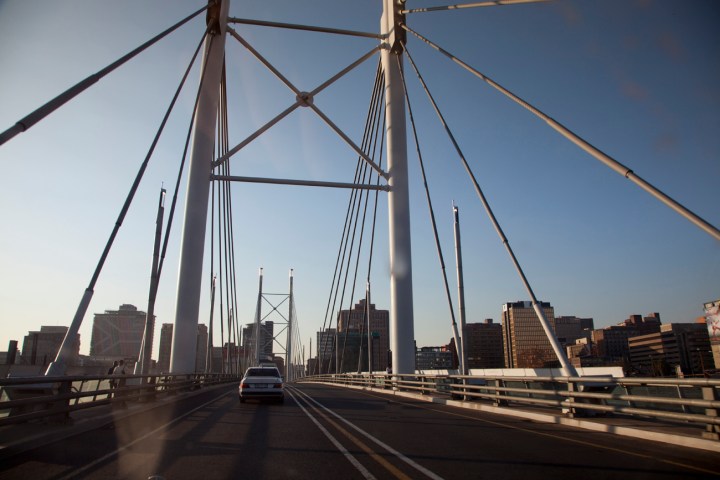Politics, South Africa
Analysis: What Joburg’s parking scheme says about democracy in SA

There seems to be a breakdown in communication between local government and its people. The former seems to understand that service to the people must happen on its terms and its terms only, even when those people are demonstrably disgruntled. Perhaps our city fathers should take a closer look at the statutes that are supposed to guide them. By KHADIJA PATEL.
“We issued notes to the public and businesses,” Pieter de Klerk, the city of Joburg’s legal representative, told reporters this week. “In Parkhurst, questions were raised if it was sufficient. We thought it was sufficient, but the community wanted more engagement.”
Alongside him, city spokesman Gabu Tugwana insisted the process was ongoing and the city remains amenable to input from stakeholders.
“The door is not closed,” he said.
Then on Thursday, Amanda Forsythe, the DA-affiliated ward councillor for Greenside and Parkview, rubbished the City’s pious protestations of a public participation process. In a tersely worded statement , Forsythe said:
“In a media briefing at city vouncil (on Wednesday), representatives from the city of Johannesburg had the audacity to inform the press that public consultation had in fact taken place with regards to the paid parking scheme being rolled out by the JMPD and private company, Ace Parking.
This is simply untrue. If it weren’t for my colleague in Parkhurst, councillor Tim Truluck, I wouldn’t have known about JMPD’s intentions to commence with paid parking in Melville from the 1st of June and to then roll it out in two further suburbs in my ward: Greenside and Parkview.
The city officials glibly stated that it was the ward councillors’ duty to take information they receive from the city and pass it on to residents, suggesting that it is we who have not done our jobs!
Had I received any information or notification on the paid parking scheme, I would have informed the residents and especially businesses in my ward immediately.”
The gap of communication between the city and its wards is replete with distrust. And while the Parkhurst councillor took it upon herself to shout her disagreement to the city’s claims, this is not the first time this year the Parkhurst ward has been at odds with the City.
When the newly refurbished Johannesburg City library was opened in February, Truluck told the media the Parkhurst library faced closure due to a staff shortage at the city’s main library.
Asked about the fate of the Parkhurst library, the city’s portfolio head of community development, Chris Vondo, vehemently denied the Parkhurst library faced closure.
“We have no intention of closing any library in this city, he said. That would be an indictment on the commitment we are making towards education in this country. It would be an indictment against the communities we serve. Those people who are saying it was going to be closed have other issues which you may not be aware of,” he said hinting that political subterfuge may have given rise to reports.
There definitely is a discord between the DA-led wards of Johannesburg and the city’s ANC-affiliated managers. This discord is exacerbating a crisis of local government in the city.
Already, disgruntled communities, be they in Themb’elihle or Parkhurst, complain about being excluded from the decision-making structures that entail local government. Those academics who spend their days and nights poring over such problems believe this disconnect is nothing more than a failure of communication.
If part of the problem does lie in linguistic difficulties there are also significant differences in attitudes and expectations between city authorities and ward councillors, between local government and the people who see this parking scheme as the latest in government’s campaign to fleece taxpayers of a few more rands. Add to it mutual feelings of mistrust, suspicion or resentment.
According to the Local Government Municipal Systems Act of 2000, municipalities are required to “develop a culture of municipal governance that complements formal representative government with a system of participatory governance”.
Public participation in government entails principally involving people in deciding their futures. But instead of this legislation imbuing local governments with a culture of public participation, communities have become frustrated with the non-delivery of local services. Service delivery protests have become a mainstay of life in the less fortunate pockets of the city. Elsewhere, people have grown wary of government.
It’s telling of the reputation of local government and its contractors that news of the paid-parking scheme has been met with vociferous demands to know exactly who owns Ace Parking. Trust between local government and the people has been eroded by a series of unresolved and messy issues – chief among them the billing crisis.
But why aren’t people taking back the power from the authorities?
Public scepticism has grown just as rapidly as participation in public life continues to wane. Nowhere have the effects of a lack of public participation been more keenly felt than in local municipalities.
This is the sphere of government where the greatest constitutional and statutory obligations to public participation exist. It is the sphere of government that is meant to be most acutely driven by the will of the people. If this parking scheme is anything to go by, then the current interpretation of public participation needs serious revision.
The 2005 Draft National Policy Framework for Public Participation states that the public participation process in local government exists ‘‘to empower local communities to have control over their own lives and livelihoods”.
Similarly, the White Paper on Local Government’s af?rms that citizens must participate in local government as consumers and service-users, as partners in resource mobilisation, as voters and as participants in policy processes. And yet, we are faced in this city, in this country, with an ever increasing democracy deficit.
Something has to change. DM
Read more:
- Joburg’s paid parking plan hits new obstacle in Business Day.
- Analysis: A national crisis of communication in Daily Maverick.
- Analysis: Crisis of local government is crisis of democracy in Daily Maverick.
Photo: A symbol of the city – Nelson Mandela Bridge. REUTERS.







 Become an Insider
Become an Insider